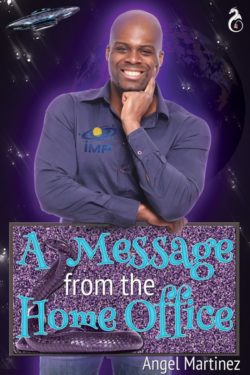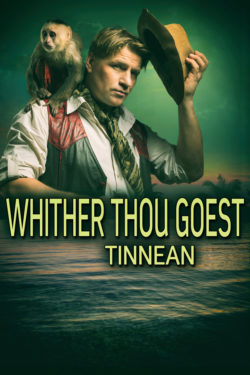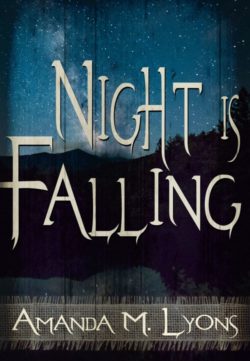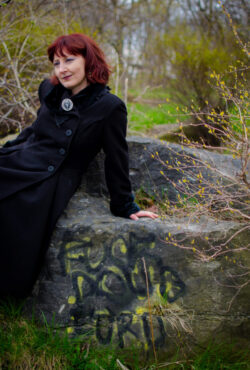by
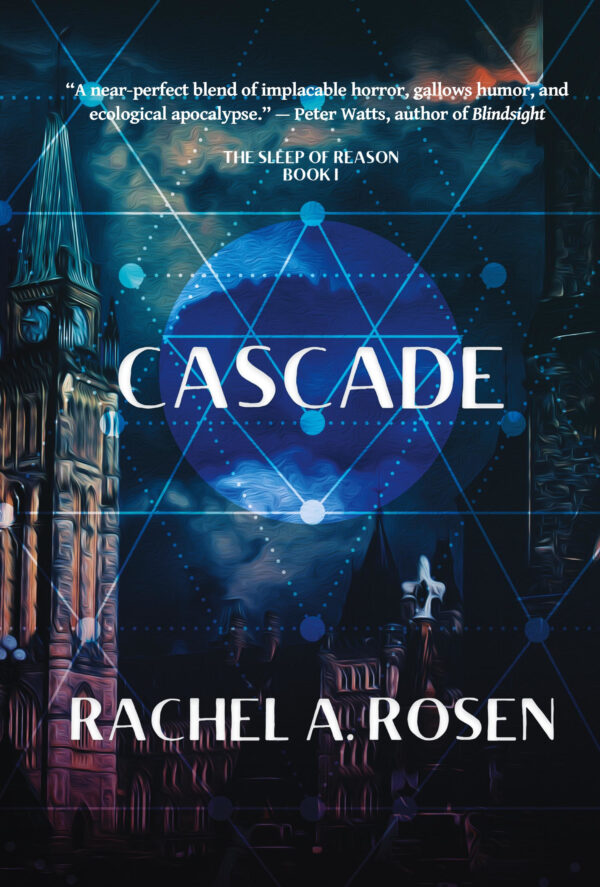
In the wake of a worsening climate crisis, magic runs rampant and demons roam across the Canadian prairies. A long-dead god stirs in the Pacific Ocean, while the wilderness is choked by invasive, screaming grass.
The Cascade has shattered political stability, leaving a scandal-plagued government clinging to power in Ottawa. As catastrophe looms ahead, a precognitive rainman, Ian Mallory, stands between run-of-the-mill corruption and a nightmarish, dystopian future. It is up to a diverse and unlikely band of activists, scientists, journalists, and one underpaid, emoji-spell wielding intern to save their beleaguered country from its own worst impulses
Publisher: The BumblePuppy Press
Cover Artists:
Genres:
Tropes: Antihero, Dystopian Governments, Evolving Powers, Found Family, Humanity is Dangerous, Magical Disaster, Reluctant Hero
Word Count: 128000
Setting: Canada
Languages Available: English
Series Type: Continuous / Same Characters
Tropes: Antihero, Dystopian Governments, Evolving Powers, Found Family, Humanity is Dangerous, Magical Disaster, Reluctant Hero
Word Count: 128000
Setting: Canada
Languages Available: English
Series Type: Continuous / Same Characters
“Don’t expect anything you do to be glamorous or interesting. Legally speaking, everything has to be catalogued and registered to comply with the Banff Accords, so think 50 pages of paperwork per spell, minimum. And since I am not the only MAI in the office, nearly all of my day is spent doing the paperwork for someone else’s spells, which go into some kind of highly classified top-secret vault guarded by three-headed dragons, as far as I can tell. Or a shredder. Probably that, but you still need to type them up for some reason.
READ MOREIf you think you’re going to be blessing beer or DJing synesthesiac orgies with your newfound mystical power, please remember that those are hobbies, not careers, and like your mother told you when you said you thought your Soundcloud was going to get you signed to a major label, always have a backup plan. Mine involves extensive research this weekend into what constitutes business casual.”
— Sujay Krishnamurthy, https://not-your-chosen-one.tumblr.com/
COLLAPSEDale Stromberg on Dale Stromberg wrote:2022’s Cascade is the first volume in Rachel A. Rosen’s The Sleep of Reason near-future fantasy apocalypse series.
Everyone with even a rudimentary education knew about climate change, ocean acidification, and sea level rise. However, the sudden outburst of actual magic twenty years ago (the Cascade) came as a total surprise. Reactions varied from country to country, region to region. Vasai Singh saved Indian cities by elevating them above the flood waters, while the US collapsed into a patchwork of smaller nations unpleasant in various ways. Canada? Canada continued on with business as normally as possible, under the circumstances.
At least for the moment.
The Party1 would like to think of itself a sort of natural ruling party. The sad fact is that it would not have clawed its way up from obscurity to dominance without the assistance of foul-mouthed MAI (magic-affected individual) AKA Party wizard Ian Mallory. Ian Mallory is plagued with endless visions of every possible future, a talent he has used to lead the Party intothe future. It now forms the government.
Mallory can only work with the materials at hand. Ideally the Party would be led by a grand heroic figure behind whom Canada could rally. The Party is actually led by Prime Minister Patrice Abel, whose talent for needless, pointless scandals is remarkable.
Past prime ministers in Abel’s situation have prevailed because their opposition was even more uninspiring. To an extent, this is true of Abel’s opposition. However, this Opposition is backed by relentless media mogul Reid Curtis. Family-Compact-descended Reid has a wealth of resources, all of which he is willing to use to pry the Party out of power.
Abel faces an election; remaining at 24 Sussex (the prime minister’s residence) depends on Mallory’s ability to foresee the path between the now the Party has and the tomorrowit wants. However, Mallory has not been entirely forthcoming. Not only is there no path to victory for the Party, all roads forward lead to a magical apocalypse that will make the Cascade look like a sneeze. Not only can Mallory not save Abel or the Party, he cannot even save himself or the world. All he can do is look for the least bad future reachable from the present they are in.
Canadians are about to discover that elections do matter, that both sides are not the same, and that the line between good old comfortable, tolerant Canada and a mass-murdering state no better than the US does not exist.
~oOo~
Imagine a Canadian version of the TV show The Thick of It, set in Canada, where Malcolm Tucker isn’t an obscenity-spewing Scottish PR mavin, but an equally foul-mouthed Newfoundlander who just happens to be an actual wizard. Also the whole world is on fire, and the only people not arguing over which colour dixie cup of water should be used to extinguish the fire are the people reaching for jerry-cans full of naphtha.
This is as Canadian as a child’s unmarked grave near a shuttered residential school and not just because it mentions the Family Compact by name. Some of the details of the crises facing Abel may seem a bit peculiar to persons unaccustomed to Westminster-style parliamentary democracies, as well to others whose versions of Westminster-style parliamentary democracies have moved past the point where scandal has any effect on the ruling oligarch’s clutch on the prime minister’s office. Canadians will find this all very comfortingfamiliar. Non-Canadians can use Wikipedia to familiarize themselves with how our government works.
There are in fact a lot more characters in this book than noted above. Some readers may be a little worried at the beginning that they will never be able to keep the whole cast in short-term memory. Be patient! This is not a forgiving narrative and it becomes much, much easier to remember those still living by the time the novel reaches its grim end. In that context, it’s a bit of a pity that the author makes us care about so many characters before their unpleasant demises.
Readers hoping for something along the lines of a Roberson Davies comic novel or an uplifting Lucy Maud Montgomery coming-of-age novel should look elsewhere. In fact, the novel falls somewhat short of The Handmaid’s Tale optimism, since there’s no afterword from any Gileadean Research Association assuring the reader that the former dystopia has become a historical footnote of interest only to academics. Sometimes there are no good choices (or people go out of their way to make bad choices) and all the survivors can do is live with the consequences for as long as they can. Not a lot of comfort here — but at least this book may help some readers reckon with the days to come on more levels than they otherwise might have.
A note on titles: ideally, a title should be searchable on its own. In this case, if you do not care to use the links below, you will have to remember to include the author’s name in the search.
Cascade is available here (Amazon US), here (Amazon Canada), here (Amazon UK), here (Barnes & Noble), here (Book Depository), and here (Chapters-Indigo).
1: Neither the Party nor its Opposition are named. Feel free to imagine:
the Party as any of the Canadian mediocre centre-left parties whose half-hearted efforts to mitigate calamity would be damned as flagrant communism by Fox News;
the Opposition as any of the Canadian coalitions of would-be theocrats, resource-extractors, bigots, one percenters, and genocide enthusiasts.
Jennifer R. Povey on View of Other Places wrote:Imagine having the magical ability to foresee the future, but foreseeing that, in all possible timelines and regardless of any choices made, a world-spanning catastrophe is fated to occur. Even if you had that ability, would it make you so different from all of us, in our time?
After all, we also see a climate catastrophe looming, perhaps mitigable but no longer avoidable. Humanity’s ecological depredations, sadly familiar in our own reality, have in the world of Rachel A Rosen’s Cascade (2022, The BumblePuppy Press) awakened long-dormant magic within the earth, a destructive power of Lovecraftian indifference to the humanity it is annihilating.
Some humans are affected by this magic and capable of using or controlling it; others fear this new power and the way those who wield it arrogate authority to decide the fates of many. What we fear, we seek to destroy. Even in a slow armageddon, humanity remains pettily human, so this eco-spec-fic is in large part political, dwelling on a secretive wizard who works within the Canadian government to effect needed changes, and on other political actors who oppose him, struggling against their own powerlessness before limitless incomprehensible magic.
That powerlessness, in the novel, is analogous to our own powerlessness against political currents and the top people in our world’s varied hierarchies. We too face the prospect of eco-disaster — of which the mystery of magic, the unfathomable power of the natural world, is a clear cognate — of unnamed masses going to their graves in service of somebody’s reelection campaign, and this disaster is caused and furthered by political paralysis. In the end, what stops humans from saving the world? Other humans.
As things worsen in Cascade, the human instinct to impose one’s will on others, immediately taking advantage of any crisis for petty power (because, in the face of apocalypse, all power is petty), informs how the ruling class exploits public fear, scarcity, and instability to indulge longtime axes-to-grind. Once the cataclysm is inevitable, the story shifts to human relationships that had earlier been crowded out in the complexities of politics, establishing what these characters stand to lose. The novelist’s delay in emphasising relationships mirrors how many of us might turn our focus too late onto what matters once futility is undeniable. The novel challenges us to consider human limits: our inability to live by our ideals, our failure to be who we must. Is humanity its own greatest enemy? Humanity, in the form of those closest to us, is also the thing we love enough to fight for. This love and fight often drive our worst behavior — which brings us back to being our own worst enemy. The novel shows these dynamics in characters across the political landscape, from prime ministers and media tycoons to researchers and anarchists.
The narrative voice is often one of ironic levity, until it swerves into dead serious tension. Many of the characters are outsize, their passions large, and the author demonstrates willingness to delve into multiple characters at different points along the opinion spectrum. Eventually there is great emotional heft in their experiences of loss. If I have one complaint, it is that (perhaps to avoid the common speculative-fiction indulgence of exhaustively explaining its world to the reader) there is a tendency to treat new information as though it is known, which sometimes left this reader unsure of the setting or situation in a given scene. (A note: the novel is apparently part of the Night Beats extended universe, but I had no trouble following things despite knowing nothing else about Night Beats.)
Cascade is a novel driven by an inner moral urgency, political without being superficially polemical, ultimately moving and inspirational of sober consideration of real perils our own world faces. Learn more about the novel and buy it at the publisher’s website.
Disclosure: I received a free advance review copy of Cascade in exchange for an honest review.
Rachel A. Rosen’s debut novel is…not exactly describable.
In Cascade she takes climate fiction, binds it with cosmic horror, and wraps the entire thing up in a newsprint bow of political drama.
The Cascade happened before the book started, in which climate fiction is believed to have triggered the return of magic to the world. And magic is not nice in this world. It drives people mad, it turns them into demons. It slowly drains life and color out of those blessed and cursed with it, including Ian Mallory.
Cascade has no clear protagonist, but rather an ensemble cast of individuals. It’s a socialist story written by an anarchist. It’s an anti-colonialist story.
It’s a lot of disparate things that come together into a brilliant work of horror.
I just wish I’d been in the mood for it. Right now, I like my climate fiction to be Pandora’s Box, that underneath all of the terrible things there might just be a little white dove called hope.
Cascade doesn’t give much in the way of hope. Cthulhu, perhaps literally, is waking up on the ocean floor. Climate change has destroyed coastal regions, sunk Bangladesh. And the magic users, despite all of their gifts, can’t seem to do anything about it. Even Ian Mallory, who can see the future can’t…in part because he has lost much of his prophetic skill. There’s a blank line, a veil across all of the futures.
At the same time, where Cascade lacks hope, it does have and offer resilience, which is just as important.
The world ends, but the story doesn’t; this is the first in a series.
It’s also a very, very Canadian book, which is always nice to see. It’s nice to see climate fiction not focused on the U.S.
I can’t say I enjoyed this book. It wasn’t fun. It was far too dark for me right now.
But if what you want is cathartic cosmic horror as an echo of climate change? If you are in the mood for dark fiction?
You might want to check it out.


